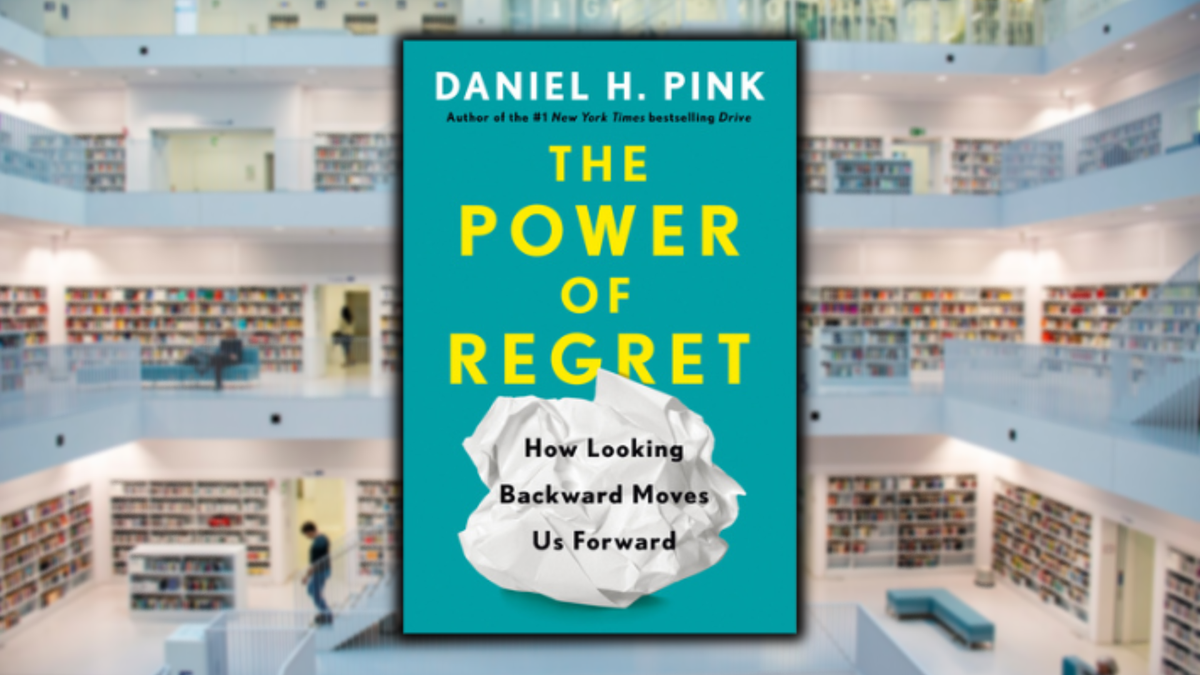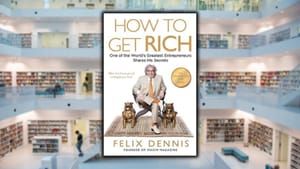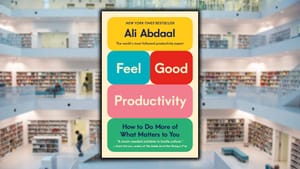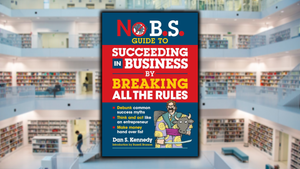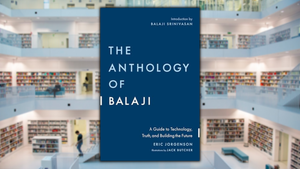
This Book is For:
*Everyone who is interested in learning how to utilize our most misunderstood emotion both to make better decisions in the future and to tell ourselves a different story about our past.
*People who are curious about how the human mind can somehow take the pain of regret and turn it into the balm of wisdom.
*Individuals who tend to be overly self-critical or engage in unhealthy rumination, and who want to be set free by learning how to process regret and turn it to our advantage.
*Anyone who has ever been stung by regrets large or small, and has ever sat awake at night wondering what might have been.
Summary:
"Regret is not dangerous or abnormal, a deviation from the steady path to happiness. It is healthy and universal, an integral part of being human. Regret is also valuable. It clarifies. It instructs. Done right, it needn't drag us down; it can lift us up."
I'm going to open this Very Serious book breakdown with one of my favorite jokes: "I took the road less traveled, and then I had to eat bugs until the park rangers rescued me." *Hold for Laughter*
Jokes aside, it's more or less a universal human experience to look back on the path we never followed and feel a nagging, painful, sometimes sinking, sickening feeling that we've somehow missed our chance, that we've traded our many unlived lives for this one, real life, and that it could have been so much better had we simply acted differently.
Virtually everyone has experienced something to the same effect, ranging from the "that might have been nice," to the "damn, I really should have done that," all the way to the "I've thrown it all away and I'll never, ever recover from this."
Anyone who says that they have no regrets is also usually viewed with suspicion by most people who have taken the time to reflect on their own personal history.
In this book, The Power of Regret, Daniel Pink refers to regret as our most misunderstood emotion and shows how it can potentially be transformed, transmuted into something extraordinarily valuable. We can reflect on our regret, reorganize it in our minds, reconceptualize it, and then use it to live better with all the time we have left.
While philosophers like Friedrich Nietzsche took a different view of regrets (we'll get to him later), Pink believes that they are a universal and healthy part of being human. He supports his arguments by offering evidence from the largest sampling of American attitudes about regret ever conducted - including his own World Regret Survey - which has collected regrets from more than 15,000 people in 105 countries.
What he found was that the most important, nagging, and painful regrets often fall into one of four categories: foundation, boldness, moral, and connection regrets, all of which we'll discuss later on.
But he also mentions how people tend to overvalue positive emotions and undervalue negative ones. Everyone wants to feel good, be happy, and avoid pain and discomfort, but ignoring and suppressing our negative feelings and emotions - including regret - cuts us off from a key source of potential growth and self-knowledge.
Importantly, if you know what people regret the most, you also know what they value the most. In terms of the core four regrets, human beings tend to value stability (health, wealth, etc.), with a dash of adventure (taking chances, making bold moves, learning, and growing), doing the right thing (and experiencing hurt when we stray from the moral path), and connecting with others (forming and deepening relationships of all kinds: social, economic, and romantic).
As you can see, however, by valuing such a wide range of important human experiences, we also open ourselves up to profound regret from multitudinous sources. There are so many ways that one single person can go wrong. Against the emotion of regret, it turns out, we never really stood a chance.
What's more, navigating regret (and life) is always an ongoing process of closing certain opportunities while at the same time opening new ones. Every action we take determines the possibilities that are available to us in the next moment, and we are always choosing, even when we do nothing.
But we are not helpless against regret, as Daniel Pink argues in this book. We can enlist this misunderstood, potentially painful emotion in service of living a larger life, gaining redemption, and reclaiming at least a portion of our remaining unlived lives.

Key Ideas:
#1: One Look Back, Two Steps Forward
“Regret is the quintessential upward counterfactual - the ultimate If Only. The source of its power, scientists are discovering, is that it muddles the conventional pain-pleasure calculus. Its very purpose is to make us feel worse - because by making us feel worse today, regret helps us do better tomorrow."
Regret is a useful gift that nobody wants. Its purpose is to use psychological pain to motivate us to analyze our past, sit with our mistakes, and use the knowledge we gain to make better decisions in the future. Regret helps us live better, but not necessarily while we're experiencing it.
Sometimes we have to look back to see how we can move forward, and the emotion of regret is perfect for this task. It would be useless if we didn't do anything with it, but the very fact that we can extract meaningful lessons from the experience of regret is an extremely valuable gift.
The mechanism that it uses is psychological pain, that awful, stomach-dropping sensation of missing some precious, fleeting, irretrievable chance we'll never get again. Regret makes us feel horrible - so horrible that we resolve, however possible, never to reexperience it, and we take drastic action to avoid feeling that way ever again. It uses pain to motivate us to make progress.
You can think of it almost like the "hot stove" of our emotional arsenal, meaning that, after placing our hands on the hot stove of regret and feeling its gut-wrenching pain once, we'll hopefully never do it again.
Some people keep making the same mistakes over and over again, but for most of us, if it hurts enough, we'll go the rest of our lives avoiding the surface of that stove. This is how regret can make us better, how it can improve our lives.
The fact is that if your life isn't bad enough, you won't be all that motivated to change it. I've been there. I was doing "fine," but I wasn't loving how my life was going. It's easy to stay in that place of "good enough" for years on end, decades even, and then at the end of your life look back and get rocked by regret.
In that sense, experiencing regret early on is one of the best things that can ever happen to you, because then you have the whole rest of your life to make sure you never feel that way again (to the extent that that's possible).
More often than not, it's regret that can most effectively turn up the temperature of our emotional stoves, motivating us to work harder, for longer, think more deeply, and live more intentional lives:
“This is one of the central findings on regret: it can deepen persistence, which almost always elevates performance."
When the pain of regret is strong enough, we work so much harder than we would if we just "kinda" wanted things to be a little bit better. What happens is that we never want to feel that way again - we're desperate to avoid that sinking feeling tearing out the bottom of our soul - and so we keep going. We persist.
#2: The Four Types of Regret
"When we envision how awful we might feel in the future if we don't act appropriately now, that negative emotion - which we simulate rather than experience - can improve our behavior."
In the next few Key Ideas, I examine each of the four types of regret in more detail, but they include Foundation, Boldness, Moral, and Connection regrets, each of them associated with various human needs and possible lessons we can learn.
Fully experiencing each regret and leaning into what they have to teach us can help us lay out a roadmap for exactly what we need to do to avoid re-experiencing that type of regret in the future.
The truly amazing thing about our brains, though, is that they have the power to simulate these regrets in our minds so that we can learn how to avoid them before they even happen. Experience is probably the best teacher, but simulated experience can serve the exact same function.
For example, boldness regrets have to do with missing the chance to grow, evolve, or pursue some opportunity by taking action in the here and now. It's failing to speak up when you have an idea that can help your team achieve its goals, failing to offer your phone number to that attractive stranger, or not accepting that exciting job offer halfway across the country and forever wondering what might have been.
When you simulate these feelings in your mind, you can go part of the way toward feeling how you would feel if you didn't take that chance. If you let that woman leave the coffee shop without saying hello to her, how would that make you feel? If that simulated regret hurts enough, it will motivate you to put potential embarrassment aside and just go say hello already!
Human nature being what it is, however, virtually no one gets to move through life without experiencing any regrets at all. It usually takes at least one dark night of the soul per regret type (sometimes hundreds) before we actually get it.
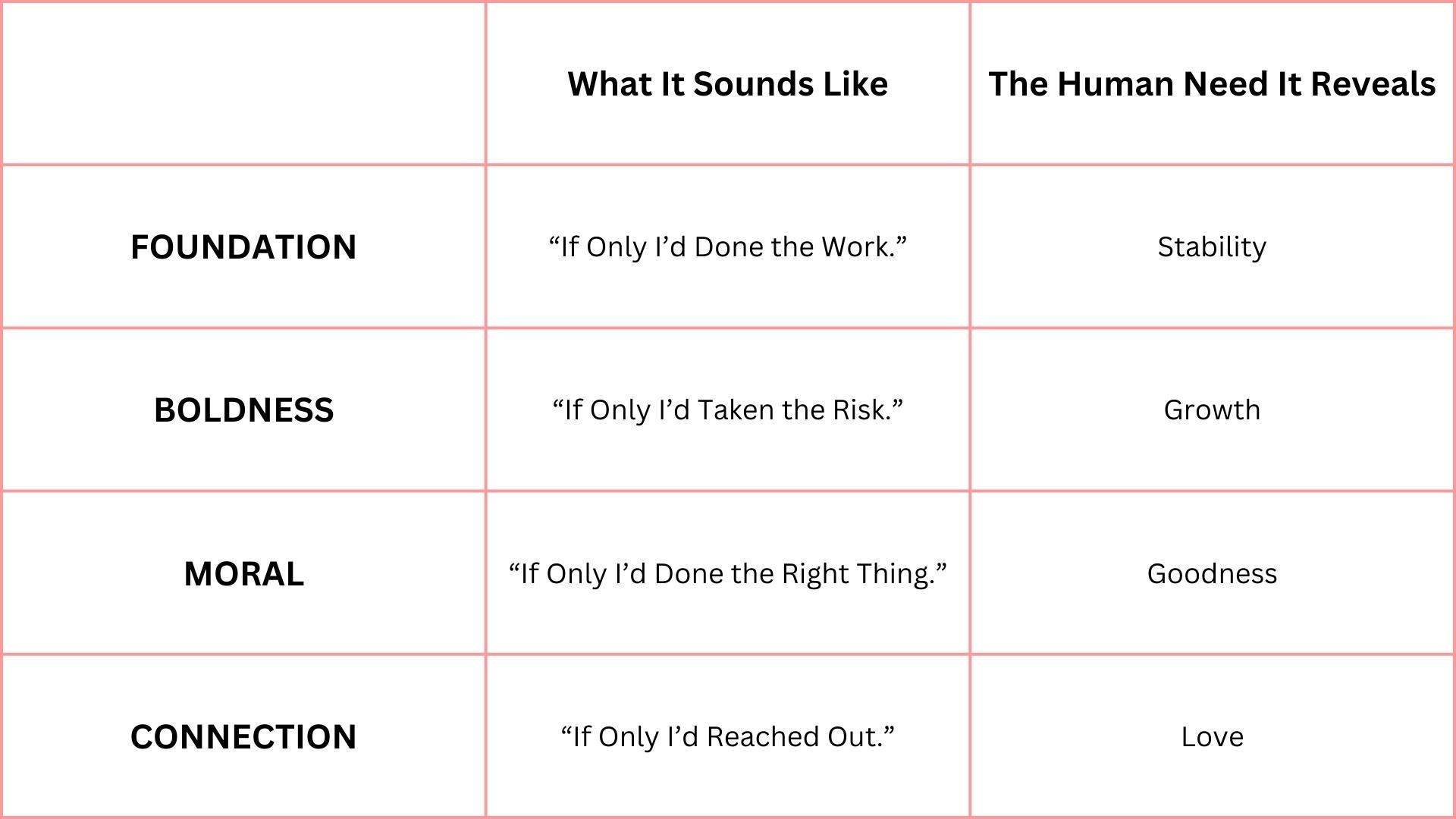
#3: Foundation Regrets
"All deep structure regrets reveal a need and yield a lesson. With foundation regrets, the human need it lays bare is stability: we all require a basic infrastructure of educational, financial, and physical well-being that reduces psychological uncertainty and frees time and mental energy to pursue opportunity and meaning. The lesson reaches back two and a half millennia. Think ahead. Do the work. Start now."
The first category of regret that we'll take a closer look at is what Daniel Pink calls "Foundation" regrets, which can be thought of as all that "base of the pyramid" stuff that places us on a secure footing from which we can venture forth and attack life.
Regrets here concern things like not getting an education, not saving enough money for the future, not reading enough, often enough - that type of thing. While not necessarily as painful as something like moral regrets, where we may have done something awful when we were younger and spent the rest of our lives hating ourselves for it, foundation regrets can still be quite difficult to live with.
What makes them even more acutely painful is the realization that it may be too late to do anything about them. You only get one shot at your twenties, you can only enroll in university courses for the first time once, and compound interest is much less powerful when you chop off the first ten years.
That being said, unlike connection regrets that take a relatively long time to manifest, foundation regrets can be somewhat ameliorated by attacking them early.
If you take a proactive stance toward foundation regrets when you're young, and you take immediate, effective action in order to reduce the probability of experiencing these types of regret when you're older, it can help protect yourself from this type of regret.
It's always easiest to stop a fire when it's still small, and even if you didn't plant a tree twenty years ago, you can still plant one today.
#4: Boldness Regrets
“All deep structure regrets reveal a need and yield a lesson. With boldness regrets, the human need is growth - to expand as a person, to enjoy the richness of the world, to experience more than an ordinary life. The lesson is plain: Speak up. Ask him out. Take that trip. Start that business. Step off the train."
Boldness regrets usually take the form of inaction, and they often appear when we fail to take risks and make moves to expand and grow as a person. They can also spring upon us in an instant, in situations where we're given that one, fleeting, beautiful chance to do something we may regret not doing for the rest of our lives.
A boldness regret can be upon us in an instant, and we can also end up thinking about it for decades. It's when the train is leaving with "her" on it, and it'll leave forever, without you, unless you cross that threshold and tell her that you're coming too.
It's when we have a killer idea pop into our head during the meeting, and then, when the boss asks the room if anybody has any other ideas, you remain silent. The door can swing open and then shut again before you have a chance to say, "Wait for me! I'm coming too!" or "You know what? I do have something in mind that might be perfect."
One thing that's important to realize here is that, with boldness regrets, we tend to regret things we didn't do, more than things we did do that just didn't work out. Wondering what might have been is usually much more psychologically painful than the failure of a business idea or a romantic relationship that didn't deepen in the way we thought it might.
When we err too heavily on the side of protecting ourselves against foundation regrets, we sometimes fall right into boldness regrets. We take the safe path - always with the future in mind - but failed to take that precious chance when it was briefly presented to us.
Naturally, it's a balance. Foundation regrets feel pretty damn awful, and so do boldness regrets. Leaving your secure job to move across the country and marry that guy isn't always the right move. But sometimes it is.
Anything can be taken too far, as when you prioritize never feeling any boldness regrets ever, and immediately jump on every single chance you have to shake things up, only to get slammed with foundation regrets when your leap didn't carry you all the way across the abyss.
So what can be done? Should you just stay home? Should you drop anchor, never leave the harbor, and always work on preventing foundation regrets? You could...Ships are perfectly safe in the harbor most of the time. But then again, that's not what ships were built for.
#5: Moral Regrets
"All deep structure regrets reveal a need and yield a lesson. With moral regrets, the need is goodness. The lesson, which we've heard in religious texts, philosophy tracts, and parental admonitions, is this: when in doubt, do the right thing."
Moral regrets can be the sharpest type of regret to be stung with, and the hardest to live with and bear. Essentially, moral regrets come about when we should have done the right thing but, for whatever reason, fell short.
It's when, years later, we realize we should have stuck up for that kid who was being bullied and told his tormentors to get f***ed. It's when we lifted that $50 from the donation jar at work because we were going through a rough time ourselves. It's when we know that we've hurt someone with our words or actions, but in the heat of the moment, we fail to do right by them.
Our moral calculations get thrown off by virtue of the fact that it's not always obvious what the right thing to do actually is. Human life is messy, morality uncertain, and regret sudden and sharp. But this type of regret is best avoided by honestly trying to do the right thing.
That's no guarantee that you'll actually do the right thing, of course, but the best you can do is the best you can do.
One thing is certain, however, and that's that any potential benefit you may have gained by acting immorally will be greatly overshadowed by the psychological cost of moral regret. It's just not worth it.
Daniel Pink also says something very interesting about moral regrets in the book:
“Moral regrets are a peculiar category. They are the smallest in number, yet the greatest in variety. They are the most individually painful. But they may also be the most collectively uplifting.
There is something heartening about grown women and men waking up at night despairing over incidents decades earlier in their lives in which they hurt others, acted unfairly, or compromised the values of their community. It suggests that stamped somewhere in our DNA and buried deep in our souls is the desire to be good."
#6: Connection Regrets
“All deep structure regrets reveal a need and yield a lesson. With connection regrets, the human need is love. Not love only in the romantic sense - but a broader version of love that includes attachment, devotion, and community and that encompasses parents, children, siblings, and friends.
The lesson of closed doors is to do better next time. The lesson of open doors is to do something now. If a relationship you care about has come undone, place the call. Make that visit. Say what you feel. Push past the awkwardness and reach out."
Connection regrets can be the most heartrending, and the ones that do the most emotional damage to the sufferer. Being connected to life, the earth, and everyone on it makes life worth living, and so regrets in that category can be understandably devastating.
Speaking for myself here, I value my own personal freedom quite highly. Freedom can be seen as almost the opposite of commitment and connection - it's the stance of "keeping your options open," waiting on the edge, unwilling to fully commit to anyone and anything outside of yourself. But even I realize that, ultimately, this can lead people to make massive mistakes.
In other breakdowns, I've also discussed the fact that freedom is simply the other side of discipline, which we can substitute for commitment or connection in this instance. In the same way that limiting our own freedom through self-discipline can help us expand our freedom later, making a commitment to something can give us the freedom to experience one of the greatest feelings any human being can experience: belonging.
Connection regrets are also spoken about in terms of doors. Closed-door regrets refer to friendships and other relationships that have slipped through the sands of time and, either because of death or loss of contact, any chance of reconnection remains impossible. Open-door regrets occur when there's still time left to make amends, get back in touch, and reconnect with people from our past from whom we've been torn apart.
Tragically, however, many people still live with connection regrets even though they have the ability to reach back out and rekindle their previous relationships. The phone number of the other person is sitting in their phone; they have their email address; they know how to reach them, except, either because of embarrassment or the possibility of experiencing awkwardness, they'd rather sit with the regret than take the risk.
But, as Daniel Pink shows in the book, oftentimes these fears and apprehensions are misplaced. The other person is almost literally waiting by the phone! They'd love to get a phone call or an email from their long-lost friend, except, for many of the same reasons, they're not likely to reach out either.
This is almost always a mistake. As long as you are alive, the door is always open. The road is never long to a friend's house, and it's already too late to make new old friends anyway.
#7: Regret Without Borders
“In our survey, family took the top spot. Nearly 22 percent of respondents voiced a regret in this category, followed closely by the 19 percent whose regret involved partners. Running just behind, and bunched together tightly, were education, career, and finance regrets. Health and friends regrets rounded out the list.
In other words, the largest and most representative survey of regret ever conducted reached a clear conclusion: American regrets span a wide range of domains rather than cluster into any single category.
People do indeed regret a lot of stuff - family relationships, romantic choices, career moves, educational paths, and more. Maybe that shouldn't surprise us. After all, regret is universal. It's a fundamental part of being human.
Human life spreads across multiple domains - we're parents, sons, daughters, spouses, partners, employees, bosses, students, spenders, investors, citizens, friends, and more. Why wouldn't regret straddle domains too?
What's more, regret makes us better. It sharpens decisions, boosts performance, and deepens meaning. Why would its benefits not reach across life domains?"
#8: Double Duped
“Our brains therefore play a double trick on us. They entice us into valuing the now too much and the later too little. Then they prevent us from understanding the nonlinear, compounding effects of our choice."
Success and happiness (and the minimization of regret) have a lot to do with battling our own brain's tendencies for immediate pleasure, and the desire for indefinite deferment of discomfort and hard work. Our brains want to help us survive, but they really couldn't care less whether we are happy or not.
Because of the way our brains are structured and process information, we tend to overvalue the present moment and our current comfort at the expense of our later success, happiness, and fulfillment. "The future" doesn't exist, not to the human brain anyway, and so it's much tougher for us to fully understand that the future is, in fact, coming our way and that it will inevitably become our present.
This is especially relevant to our discussion of regret because most of the consequences of our actions (or inactions) take place in the future. You can spare yourself the discomfort of speaking up for yourself in the present moment, but it could tear you up inside later, and that's very difficult for the human brain to conceptualize.
It's hard to do the right thing in the moment, because the "right" thing is often what we least feel like doing, and our brain is all too happy to spare us the discomfort by simply taking the easy way out.
On the other end, we also have a hard time understanding the concept of compounding, and what Pink refers to as the "nonlinear" effects of our choices.
We save ourselves the embarrassment of potentially being turned down for our dream job and we feel better today. Years later, however, we look back and see that that choice cost us everything. We were qualified for the job, we could have gotten it, and we would have then embarked on a decades-long career in our desired field, been able to save up more money, invested better for our retirement, and had the resources to start the kind of family we always dreamed of having.
But, all those decades ago, we decided to take the easy way out - we probably took the easy way out our entire lives - until the very end when we look back and realize that it's too late. There are worse things than embarrassment and hardship, but one day it will be too late, and there's nothing worse than too late.
#9: Human Flourishing in Five Words
“George Vaillant, another Harvard psychiatrist, headed the Grant Study for more than thirty years. In an unpublished 2012 manuscript, he reflected on what he'd learned from the experience.
After eight decades, hundreds of subjects, thousands of interviews, and millions of data points, he said he could summarize the conclusion of the longest-running examination of human flourishing in five words: 'Happiness is love. Full stop.'"
George Vaillant, the man quoted above, spent 35 years as Director of the Study of Adult Development at the Harvard University Health Service. Its purpose was to uncover the keys to leading healthy, happy lives, and to do so, they charted the lives of 824 men and women for more than 80 years. What they found is that, apparently, living "the good life" requires other people.
As it turns out, we're massively overcomplicating what it really takes to lead a fantastic life and flourish. We have too many possessions and too little joy. We overemphasize titles and accomplishments and underappreciate the strength and power of simple, honest, human connection.
So says George Vaillant: The key to living a better life is to be more expansive in your generosity, and more generous with your love. "Happiness is love. Full stop."
#10: The Regret Optimization Framework
“Our goal should not be to always minimize regret. Our goal should be to optimize it. By combining the science of anticipated regret with the deep structure of regret, we can refine our mental model. Call it the Regret Optimization Framework. This revised framework is built on four principles:
1. In many circumstances, anticipating our regrets can lead to healthier behavior, smarter professional choices, and greater happiness.
2. Yet when we anticipate our regrets, we frequently overestimate them, buying emotional insurance we don't need and thereby distorting our decisions.
3. And if we go too far - if we maximize on regret minimization - we can make our situation even worse.
4. At the same time, people around the world consistently express the same four core regrets. These regrets endure. They reveal fundamental human needs. And together, they offer a path to the good life.
The Regret Optimization Framework holds that we should devote time and effort to anticipate the four core regrets: foundation regrets, boldness regrets, moral regrets, and connection regrets. But anticipating regrets outside these four categories is usually not worthwhile.
So, under the Regret Optimization Framework, when deciding a course of action, begin by asking whether you are dealing with one of the four core regrets. If not, satisfice. For example, if you're buying lawn furniture or a(nother) microwave oven, that decision is unlikely to involve any fundamental, enduring human need. Make a choice and move on. You'll be fine.
If the decision does involve one of the big four, spend more time deliberating. Project yourself into the future - five years, ten years, at age eighty, whatever makes sense. From that future vantage point, ask yourself which choice will help you build your foundation, take a sensible risk, do the right thing, or maintain a meaningful connection. Anticipate these regrets. Then choose the option that most reduces them. Use this framework a few times, and you will begin to see its power.
Our everyday lives consist of hundreds of decisions - some of them crucial to our well-being, many of them inconsequential. Understanding the difference can make all the difference. If we know what we truly regret, we know what we truly value. Regret - that maddening, perplexing, and undeniably real emotion - points the way to a life well lived."

Book Notes:
“In fact, I have yet to uncover a study disconfirming the ubiquity of this emotion. (And believe me, I've looked hard.) Scholars in every field, approaching the subject from different directions and using a variety of methodologies, arrive at the same conclusion: 'To live, it seems, is to accumulate at least some regrets.'"
“At some point in its pages, nearly every popular book about human behavior wheels out William James, the nineteenth-century American polymath and Harvard professor who wrote the first psychology textbook, taught the first psychology course, and is widely considered to be the founding parent of the field. This book will now honor that tradition."
"My thinking is first and last and always for the sake of my doing."
-William James
“If you have a broken heart, it means you have done something big enough and important enough and valuable enough to have broken your heart."
-Mara Abbott
“I regret that I didn’t appreciate reading earlier in life. Now I see the value of reading and often wonder what the compounding effect would have been if I had started ten to fifteen years earlier."
-Thirty-three-year-old Michigan man, regret survey respondent
“The researchers concluded that it was the setback itself that supplied the fuel. The near miss likely prompted regret, which spurred reflection, which revised strategy, which improved performance."
“People who asserted their identities rarely regretted it, even when those identities ran counter to the dominant culture. People who suppressed their identities talked about denying themselves the potential to live fully."
“People often talk about regret in terms of doors. Amy has a 'closed door' regret. As she told me, the opportunity to restore her connection with Deepa is gone. Cheryl has an 'open door' regret. The opportunity to reconnect with her college friend remains."
“The prospect of giving compliments, Boothby and Bohns found, can make people skittish. They worry 'their awkwardness is on display and that people are noticing - and judging - them for their many flaws and faux pas.'
But in the experiments, people's predictions - about themselves and others - proved way off. They drastically overestimated how 'bothered, uncomfortable, and annoyed' the person receiving their compliment would feel - and underestimated how positively that person would react. It wasn't awkward at all.
What's going on in these situations is a phenomenon that social psychologists call 'pluralistic ignorance.' We mistakenly assume that our beliefs differ vastly from everyone else's - especially when those private thoughts seem at odds with broader public behavior.
So, when we struggle to understand a lecture, we don't ask questions because we erroneously believe that because other people aren't asking questions, that means they understand - and we don't want to look dumb. But we don't consider that other people might be equally befuddled - and equally nervous about seeming stupid. We're confused, but we stay confused because we falsely believe nobody but us is confused!
Or surveys of college students reveal that most students don't drink excessively. But those students think that they're the exception and that all their classmates are constantly getting hammered, which perversely reinforces a social norm that relatively few people truly endorse.
Our concerns about the awkwardness of reconnecting with someone from whom we've drifted conform to this pattern. We too often presume that our own preferences are unique."
“You’re almost always better off to err on the side of showing up. And if it's awkward, then it's awkward and you'll live. It'll be fine. But if you don't show up, it's lost forever."
-Cheryl Johnson
“We seek a measure of stability - a reasonably sturdy foundation of material, physical, and mental well-being. We hope to use some of our limited time to explore the grow - by pursuing novelty and being bold. We aspire to do the right thing - to be, and to be seen as, good people who honor our moral commitments. We yearn to connect with others - to forge friendships and family relationships bonded by love. A solid foundation. A little boldness. Basic morality. Meaningful connections. The negative emotion of regret reveals the positive path for living."
“Some people find illeism annoying (although it doesn't bother Daniel Pink). But its existence as a style of speech and narration exemplifies the final step in the regret-reckoning process. Talking about ourselves in the third person is one variety of what social psychologists call 'self-distancing.'
When we're beset by negative emotions, including regret, one response is to immerse ourselves in them, to face the negativity by getting up close and personal. But immersion can catch us in an undertow of rumination. A better, more effective, and longer-lasting approach is to move in the opposite direction - not to plunge in, but to zoom out and gaze upon our situation as a detached observer, much as a movie director pulls back the camera.
After self-disclosure relieves the burden of carrying a regret, and self-compassion reframes the regret as a human imperfection rather than an incapacitating flaw, self-distancing helps you analyze and strategize - to examine the regret dispassionately without shame or rancor and to extract from it a lesson that can guide your future behavior."
“If I were replaced tomorrow, what would my successor do?”
-Andy Grove
"Living as if you were living for the second time and as if you had acted the first time as wrongly as you are about to act now!"
-Viktor Frankl
“Anticipated regret is particularly useful in overcoming regrets of inaction."
“When I overlaid the responses to both questions, the results were confounding. Just 5 percent of the sample disagreed with both propositions. Those people said they didn't have free will and that things didn't happen for a reason. Call this tiny cohort the nihilists.
Meanwhile, 10 percent believed they exercised free will while rejecting the idea that events unfold for a purpose. Call this group the individualists. Another 10 percent held the reverse view. Free will was a myth and everything happened for a reason, they said. These are the fatalists.
But the largest group by far - three out of four Americans in the survey - maintained both that they have free will and that most things happen for a reason, two beliefs that seem to contradict each other.
What to call this mystifying group?
I thought about it awhile. And after careful consideration, the name I've chosen to assign them is...the humans.
Open the hood of regret, and you'll see that the engine powering it is storytelling. Our very ability to experience regret depends on our imagination's capacity to travel backward in time, rewrite events, and fashion a happier ending than in the original draft.
Our capacity to respond to regret, to mobilize it for good, depends on our narrative skills - disclosing the tale, analyzing its components, and crafting and recrafting the next chapter.
Regret depends on storytelling. And that raises a question: In these stories, are we the creator or the character, the playwright or the performer? As the survey respondents told me - with their seemingly contradictory, bafflingly human responses to my perfectly logical questions - we are both.
If our lives are the stories we tell ourselves, regret reminds us that we have a dual role. We are both the authors and the actors. We can shape the plot but not fully. We can toss aside the script but not always. We live at the intersection of free will and circumstance."
“Regret offers us the ultimate redemption narrative. It is as powerful and affirming as any positive emotion. But it arrives on our doorstep wearing a disguise. Just ask Cheryl Johnson.
The regret she harbored about losing touch with her close friend Jen continued to nag at her - so much so that one morning in May 2021, she pushed past her awkwardness and decided to send Jen an email. 'I suspect it might be strange to hear from me after all these years,' the message began. Although they hadn't communicated in twenty-five years, Jen replied within hours.
The two old friends then decided to meet for a virtual lunch to reconnect. 'I finally got to say to her that I knew I made a mistake,' Cheryl told me after that lunch, 'and how much I regretted losing so many years that could have been spent watching our lives unfold together.' Jen's response? 'But we still have a lot of years left.'
If we think about regret like this - looking backward to move forward, seizing what we can control and putting aside what we cannot, crafting our own redemption stories - it can be liberating. It has been for me.
One of my deeper regrets is that I wasn't kinder to people when I was younger. I'm not sure that happened for a reason, but I'm sure I can find reason in the recollection. Now I try (not always successfully) to make kindness a higher priority.
I also regret moments of dishonesty, which were not cataclysmic yet somehow remain seared in my memory. Now I try to avoid placing new items on those mental shelves by working harder to do the right thing.
I regret certain educational and professional choices that I made. But now I kick myself less for these blunders and use the lessons I learned to guide the rest of my life and to inform the advice I offer others.
I regret not forging enough close connections with friends, mentors, and colleagues. Now I try harder to reach out.
I regret not taking enough entrepreneurial and creative risks, not being as bold as my privilege allows and my heart desires. Now...stay tuned.
After a few years immersed in the science and experience of our most misunderstood emotion, I've discovered about myself what I've discovered about others. Regret makes me human. Regret makes me better. Regret gives me hope."
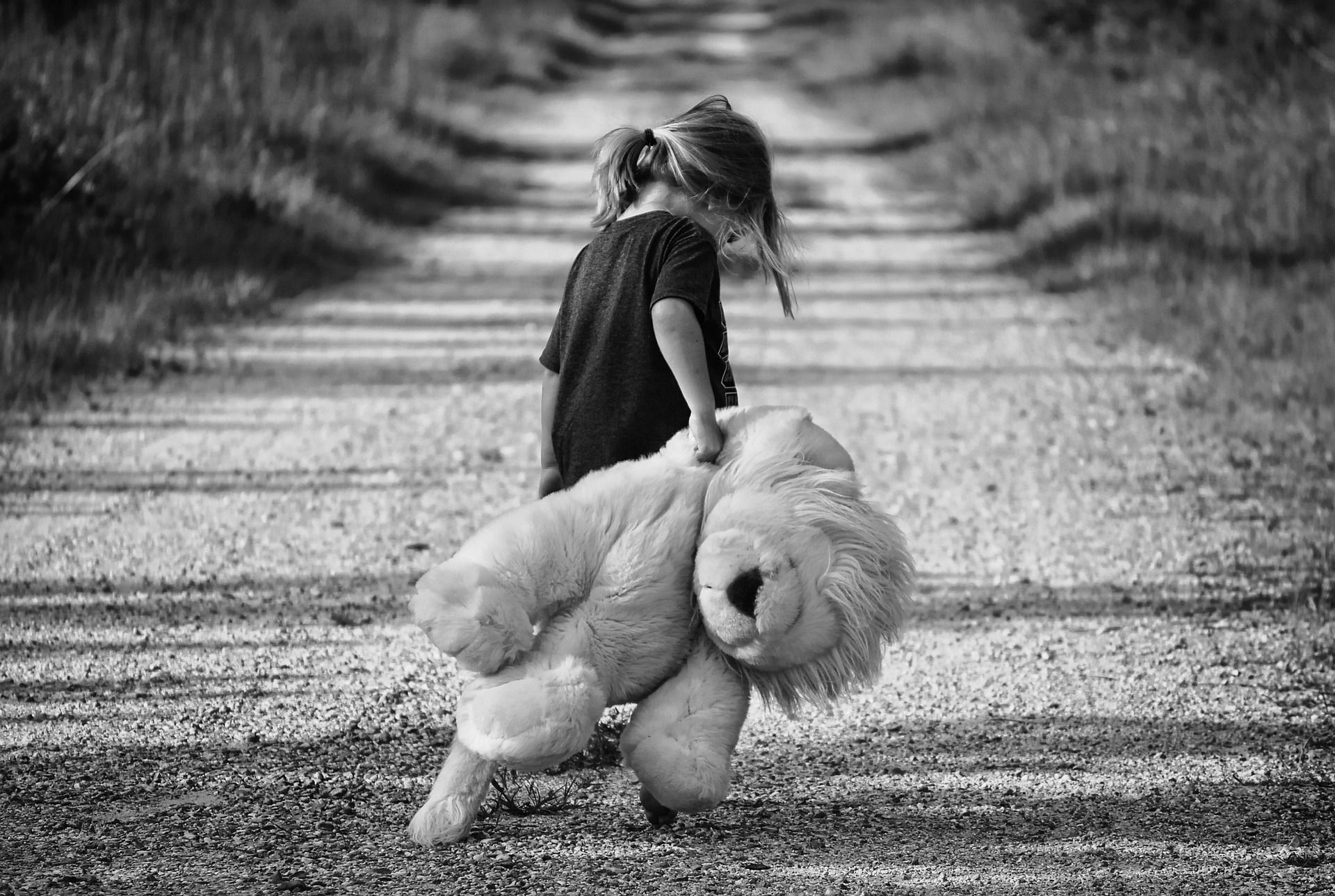
Important Insights from Related Books:

The Second Mountain, by David Brooks:
What if you spent your whole life climbing the ladder to success, only to find that it was leaning against the wrong building?
In this spectacular and damn-near urgent book, political and cultural commentator David Brooks uses a different vertical metaphor - two mountains and a valley - to explore the devastating effects of our culture's unrestrained individualism, the dark night of the soul that's waiting for us when we discover that we've been sold a bill of goods, and what a full life of what he calls "moral joy" might look like.
The "first mountain" represents the relentless pursuit of success and achievement that's possessed the mind of the Western world for so long.
When you climb the first mountain, what you're really cultivating are the "résumé virtues" - the skills and talents you bring to the marketplace. On the second mountain, it's all about the "eulogy virtues" - what they talk about at your funeral.
The Second Mountain is an intensely personal book and one that will stop you cold in dozens of places as you pause to ponder the profundity of what others have discovered about the true aims of life. It can't just be about the self.
A real human life - a committed, relational life - is lived on the second mountain, with others. For others. Brooks explains how we got this all mixed up, and he also offers numerous practical and lofty ideas about how we can restore balance to our inner lives.
Sample Quotes from the Book:
“The lesson is that the things we had thought were most important - achievement, affirmation, intelligence - are actually less important, and the things we had undervalued - heart and soul - are actually most important."
“Life is not a solitary journey. It is building a home together. It is a process of being formed by attachments and then forming attachments in turn. It is a great chain of generations passing down gifts to one another."
“When you actually look around the world - parents looking after their kids, neighbors forming associations, colleagues helping one another, people meeting and encountering each other in coffee shops - you see that loving care is not on the fringe of society. It's the foundation of society."
Read the Full Breakdown: The Second Mountain, by David Brooks
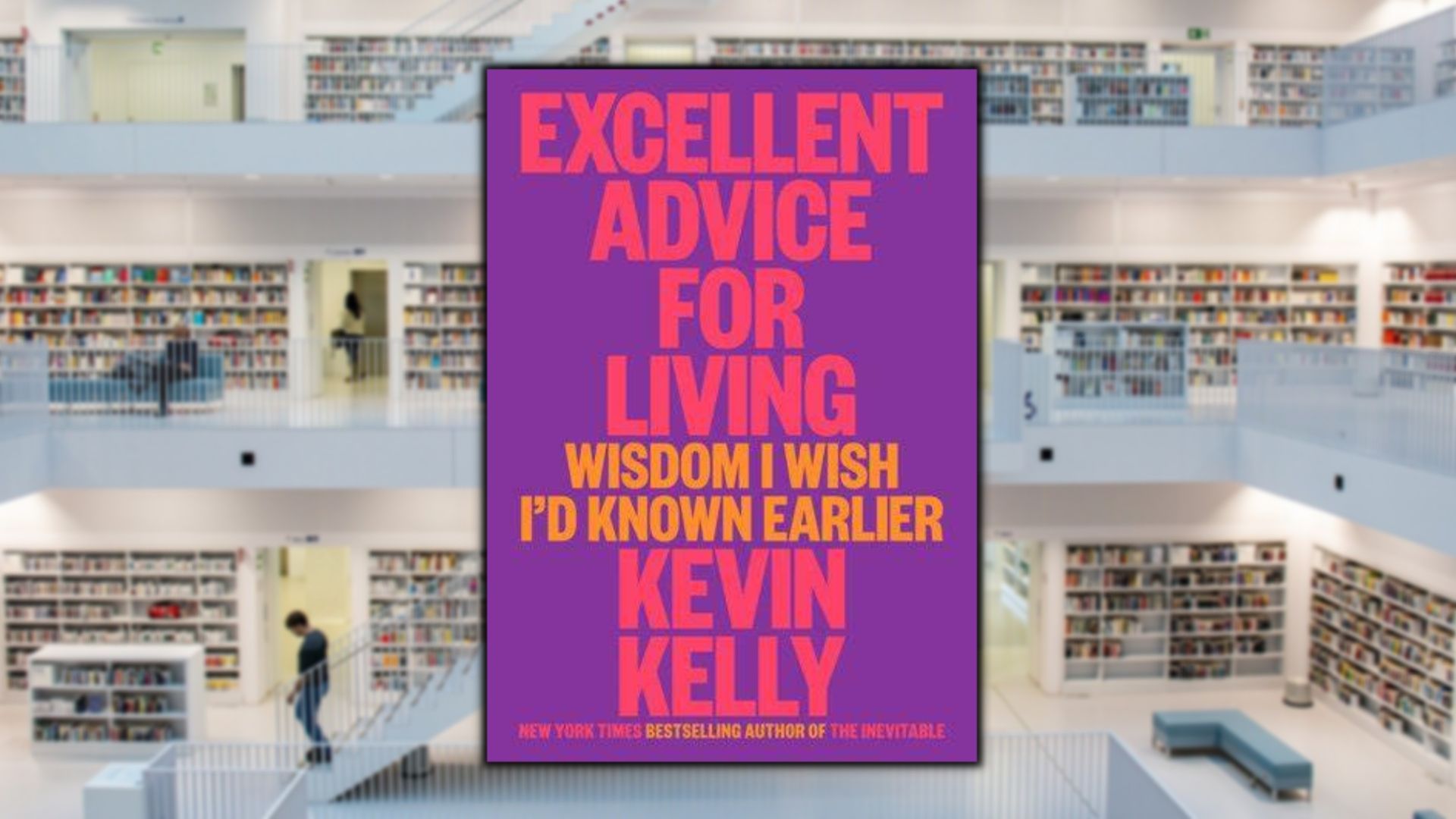
Excellent Advice for Living, by Kevin Kelly:
Just because you're old doesn't mean that you automatically have much valuable wisdom to share. Some people haven't really lived 10,000 days, they've just lived the same day 10,000 times. Kevin Kelly, however, is an exception, and it turns out that the brilliant and insightful tech innovator gives excellent life advice.
For anyone hearing about Kelly for the first time, he is the co-founder of Wired magazine and a highly-praised futurist and author whose optimistic outlook on the next chapter of human history has inspired a generation to think bigger and to advance confidently into the next stage of human evolution.
As Kelly says in the quote that began this summary, the life advice presented in this book was originally intended for his young adult children to help them navigate the hazardous future we all find ourselves hurtling toward.
But the very act of writing them down caused him to realize that he had much more to offer than he thought he did when he began, which resulted in him eventually compiling this wonderful collection of 450 wise, practical, and incredibly valuable aphorisms.
The range of subjects they cover is as wide and deep as life itself, and so you'll find here advice about setting ambitious goals, cultivating peace of mind and equanimity, dealing with loss, organizing your life around adventure and spontaneity, dispelling anger and sadness, minimizing regret, and so much more.
Now, in a book with hundreds and hundreds of wise, practical aphorisms, my choices about which ones to expand on and which ones to ignore likely say more about me than they do about whether they're the "best" aphorisms or the "most useful" ones.
As you read the book and filter this life advice through your particular worldview, situation, and understanding, you're probably going to disagree with at least a few of them, or find them irrelevant or silly, etc. But which ones those are will change depending on who you are. That's part of what makes books so magical!
That being said, if it's true that your quality of life is roughly equal to the quality of the 20-30 people who give you the best advice, then you'd be wise to include Kevin Kelly in that group.
Sample Quotes from the Book:
“Over the long term, the future is decided by optimists. To be an optimist, you don't have to ignore the multitude of problems we create; you just have to imagine how much our ability to solve problems improves."
“We tend to overestimate what we can do in a day, and underestimate what we can achieve in a decade. Miraculous things can be accomplished if you give it 10 years. A long game will compound small gains that will be able to overcome even big mistakes."
“The advantage of a ridiculously ambitious goal is that it sets the bar very high, so even if your effort falls short, it may exceed an ordinary success."
Read the Full Breakdown: Excellent Advice for Living, by Kevin Kelly
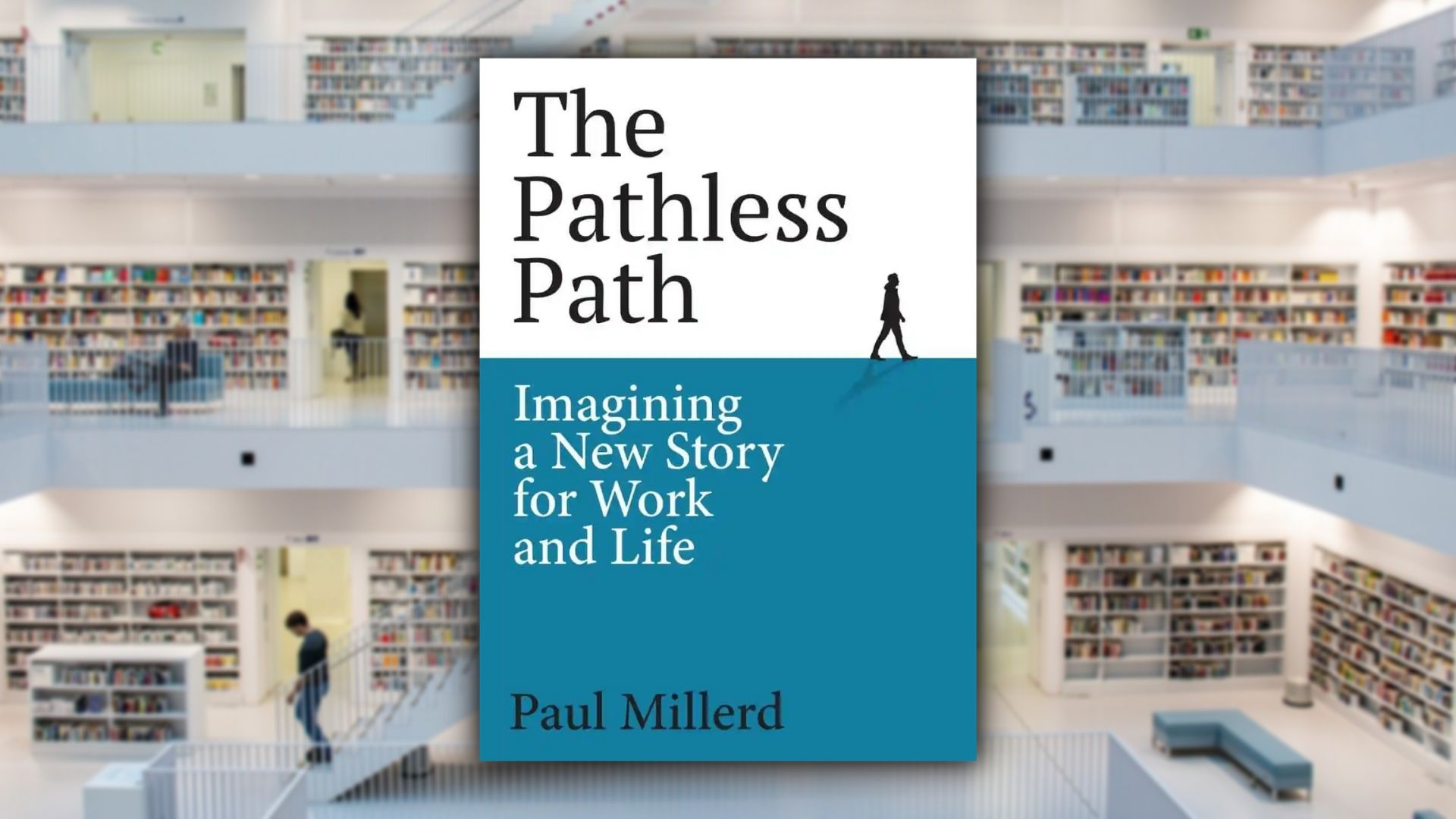
The Pathless Path, by Paul Millerd:
The chances of a perfect life path being successfully scripted for you by someone else are precisely zero. We exist in a community of others, but individually, we are completely alone and our lives are up to us.
More than that, we have the opportunity - the ability - to curate our own reality every moment, and by definition, no one can do this for us. We think that the meaning of life is "out there" and that we have to find out what it is. When in reality, it is Life that asks us the questions, and how we live is our answer.
In the same way, Paul Millerd doesn't have any answers. There are no hacks or step-by-step formulas in this book, no mandatory reading lists, and no milestones you have to hit in order to live a meaningful life.
Instead, The Pathless Path is about the invisible scripts that shepherd us into prescribed modes of living and being in the world; it's about freedom and creativity; it's about money, meaning, and work; and it's about being fearlessly, unapologetically yourself, in a world that shouts back, "You can't do that!"
It's also about going somewhere, but not following anything. Getting lost, and finding yourself. Leaving, but never arriving.
The default path - doing what everyone is doing, living the same day, week, month, and year that everyone else is living over and over again - used to work for most people. But this future that we're building together is not a default future. We have so many more options and opportunities - possibilities for our lives that we can explore and take to their logical conclusions. The default path is dying away, and we have to come to terms with our own freedom and what we want to do with it.
I mean, here you are, the universe's most spectacular creation, and you're just kinda getting by. Living a "good enough" life, surviving day to day, coasting through a default world you never made.
The Pathless Path is Paul Millerd's answer to the question of what makes meaningful work and what we might aspire to in our lives. But you and I can never be Paul Millerd. His life is taken. You can only be yourself, and I can only be myself. The pathless path is narrow, wide enough for only one person. You.
Sample Quotes from the Book:
"I want to see people live the lives they are capable of, not just the ones they think they are allowed to live."
“The pathless path is an alternative to the default path. It is an embrace of uncertainty and discomfort. It's a call to adventure in a world that tells us to conform. For me, it's also a gentle reminder to laugh when things feel out of control and trust that an uncertain future is not a problem to be solved."
“‘Are those the only two options?’ I asked. 'Yes,' he replied. I listed a few other paths that he conceded were possible, but he added, 'I don't know anyone who has done that.'
Many people fall into this trap. We are convinced that the only way forward is the path we've been on or what we've seen people like us do. This is a silent conspiracy that constrains the possibilities of our lives."
Read the Full Breakdown: The Pathless Path, by Paul Millerd
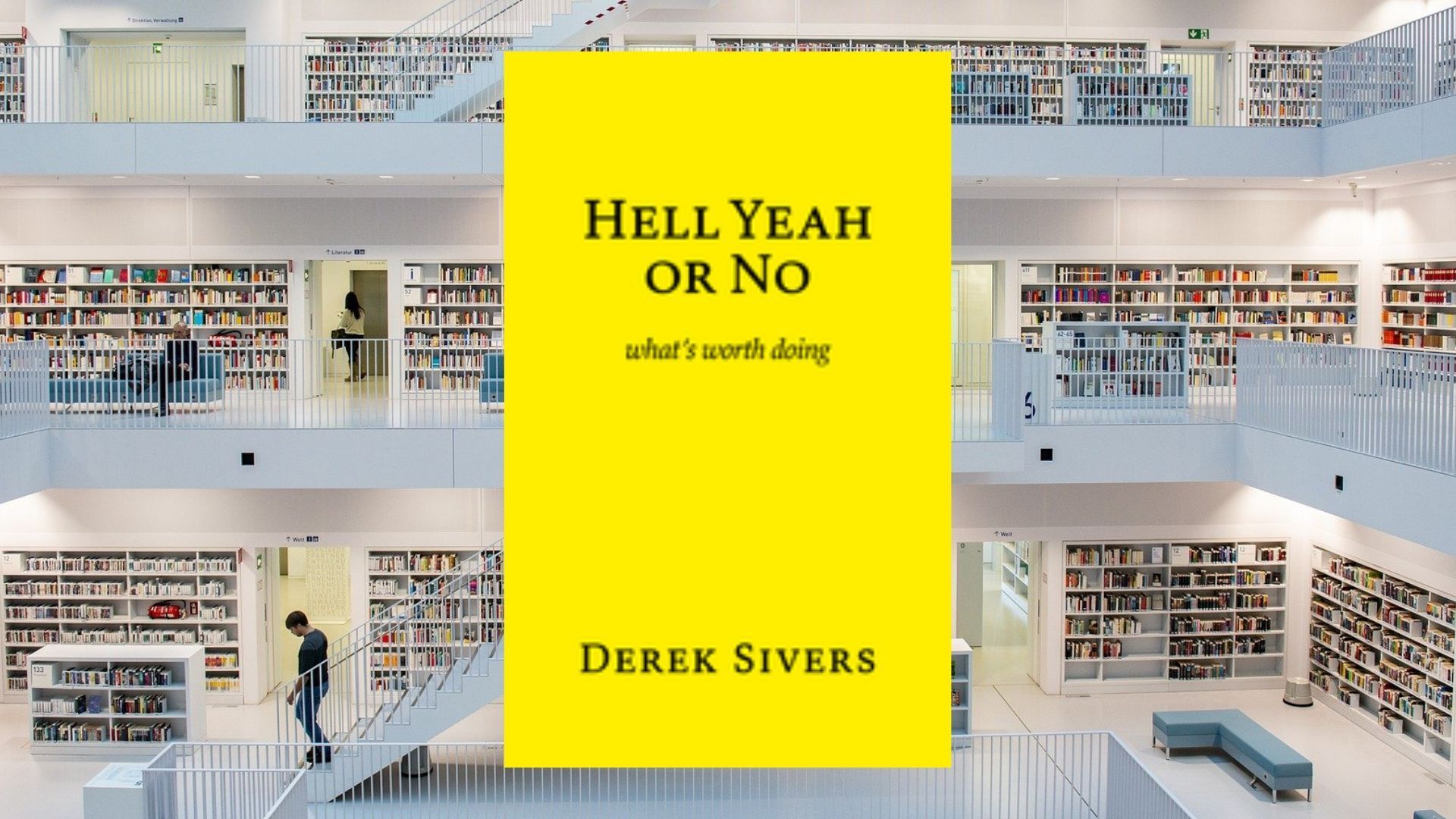
Hell Yeah or No, by Derek Sivers:
Certain authors just become associated with particular ideas over time, and one that I continue to profit from handsomely – year after year after year – is Derek Sivers’ insight that when making a decision, it’s either a “Hell yeah!” or it’s a “No.”
Either you’re consumed with interest by what you’ve decided to do - it’s just so completely obvious that this is the thing you should be doing/want to do - or you’re better off not doing it at all.
Hell Yeah or No is a fairly quick read, full of exceptionally useful frameworks for thinking, and I ended up with dozens of book notes and brilliant ideas to think about later. The interesting thing, though, is that many of Sivers' conclusions contradict each other!
Derek is a special thinker in that way. He can calmly and wisely approach big, intimidating questions, and he can disagree with himself multiple times (sometimes even in the same essay), all while getting closer and closer to a tentative answer that he then rigorously tests in the lab of his own life.
He's no armchair philosopher either! I'd even say that he's one of the most interesting people alive today. The dude sold his company, CD Baby, for millions of dollars, enabling him to forget about earning more money (he doesn’t need it or want it), and letting him put every single creative neuron in his brain into his creative work and, you know, living his actual life. And what a life!
In the book itself, he prescribes the lifestyle of the happiest people that he knows: Having a well-paying job, while seriously pursuing their art for love, not money.
He writes that we all have a need for stability and adventure, certainty and uncertainty, money, and expression, and when we're out of balance, we need to step back a bit into solitude and silence, and really think through these problems for ourselves.
No one else on the planet has more at stake when it comes to your life than you do. Making good decisions and living fearlessly according to what you've decided takes astounding courage, but no one is more capable of doing it than you are.
Sample Quotes from the Book:
"When life or a plan feels ultimately unsatisfying, I find it's because I've forgotten to find the intersection of all three: what makes me happy, what's smart, and what's useful to others."
“Say no to almost everything. This starts to free your time and mind.
Then, when you find something you're actually excited about, you'll have the space in your life to give it your full attention. You'll be able to take massive action, in a way that most people can't, because you cleared away your clutter in advance.
Saying no makes your yes more powerful."
“You don’t want that horrible regret, feeling like you spent your life pursuing what someone said you should want, instead of what you actually wanted.
For example, if you want to make a lot of money, you need to admit that. If you want to be famous, you need to pursue that. If you want freedom and no responsibilities, or want to learn as much as possible, or whatever else, you need to realize it and embrace it.
Whatever you decide, you need to optimize for that goal, and be
willing to let go of the others.”
Read the Full Breakdown: Hell Yeah or No, by Derek Sivers

The View from the Opposition:
No one's ideas are beyond questioning. In this section, I argue the case for the opposition and raise some points you might wish to evaluate for yourself while reading this book.
#1: The Eternal Recurrence
The great philosopher Friedrich Nietzsche put forth a fascinating thought experiment in his book, Thus Spoke Zarathustra. It's a difficult book, although very well worth reading, and it's where he writes about what he calls the Eternal Recurrence.
Nietzsche believed that the measure of a person's strength of will was to what extent they could affirm their life completely and totally. He was basically the patron saint of the "no regrets" lifestyle, and according to him, the strongest individuals among us could will their lives to turn out exactly as they had, over and over again for all eternity, never wishing anything to be different.
Needless to say, this is something of a radical stance toward regret and it's obviously not one that everyone is capable of adopting. Friedrich Nietzsche himself didn't have a particularly happy life, and you have to wonder whether even he, during one of his weaker moments, may have wished for at least some part of his life to have turned out differently.
And yet, I think about the Eternal Recurrence quite often and I do believe that it's worth asking yourself if you are strong enough to affirm your life completely and totally - to claim your personal history, with all of its twists and turns of fate, and still look toward the future with optimism.
#2: The Anti-Stoic
Another group of philosophers, the Stoics, might take a rather dim view of the power of regret as well. Nietzsche didn't really take to Stoic philosophy himself, but they all agreed that it was a waste of time lamenting the past and wishing for your life to be different than it is.
Specifically, Stoics wouldn't accept the emotion of regret because many things about their pasts were not under their direct control.
That being said, they would definitely approve of the fact that one could transform their regret into something better and move forward, using the lessons their past has taught them. That's totally Stoic.
#3: The Line Between Past and Future
Another question worth considering has to do with the proper boundary between analyzing past regrets and advancing confidently into the future. Exactly how much looking back should we actually do?
Pink addresses this a little bit in the book, and it's his view that relatively inconsequential decisions concerning regrets outside the core four regrets should receive significantly less attention than those concerning our deepest values. I would tend to agree.
But where do we draw the line? How good is "good enough" when it comes to the core four regrets?
Ultimately, I think that's a question each of us will have to deal with ourselves, but doing your best is often enough here. I mean actually doing your best. If you get to the end of your life and believe that you honestly did every single thing you could to live the best one possible, that's a pretty powerful antidote to regret right there.
"The test of a first-rate intelligence is the ability to hold two opposed ideas in the mind at the same time and still retain the ability to function.”
-F. Scott Fitzgerald

Questions to Stimulate Your Thinking:
The quality of your questions determines the quality of your life. That's also how you get the absolute most out of any book that you decide to read:
You ask great questions the whole time - as though the book was on trial for its life.
Here in this section are a few questions that can help guide and stimulate your thinking, but try to come up with your own additional questions, especially if you decide to read this book the whole way through...
#1: "Do you believe that it's possible to go through life without experiencing any regrets at all?"
#2: "Looking back on your life from the present moment, what is one significant regret you have?"
#3: "How common do you believe this particular regret is among people your age? Do you believe that it's relatively rare? Or that it's perhaps extremely common? Does this change how you feel about this regret?"
#4: “Imagine it is ten years from now and you're looking back with pride on how you responded to this regret. What did you do?"
#5: "Do you have any foundation regrets? What other choices would you have made if you had the chance to do your life over again? What advice would you give other people in this area of their lives?"
#6: "Do you have any boldness regrets? What other choices would you have made if you had the chance to do your life over again? What advice would you give other people in this area of their lives?"
#7: "Do you have any moral regrets? What other choices would you have made if you had the chance to do your life over again? What advice would you give other people in this area of their lives?"
#8: "Do you have any connection regrets? What other choices would you have made if you had the chance to do your life over again? What advice would you give other people in this area of their lives?"
#9: "Would you feel uncomfortable if someone you hadn't seen for ages reached out and stated their desire to reconnect? Or would you welcome their overture, maybe even wishing they had made the call sooner? Is there someone from your past who you should call first?"
#10: "What's your plan going forward when it comes to minimizing regrets in the future? Have you thought about your long-term strategy when it comes to balancing comfort and safety in the present with the possibility of experiencing future regrets because of your choices?"
"Judge a man by his questions, rather than by his answers."
-Voltaire

Action Steps:
So you've finished reading. What do you do now?
Reading for pleasure is great, and I wholeheartedly support it. However, I am intensely practical when I'm reading for a particular purpose. I want a result. I want to take what I've learned and apply it to my one and only life to make it better!
Because that's really what the Great Books all say. They all say: "You must change your life!" So here, below, are some suggestions for how you can apply the wisdom found in this breakdown to improve your actual life.
Please commit to taking massive action on this immediately! Acting on what you've learned here today will also help you solidify it in your long-term memory. So there's a double benefit! Let's begin...
#1: Reverse Your Old Year's Regrets
Most people spend the last few days of the year thinking about all the new positive changes they want to make in the coming year. But how many people look backward at the previous year, and try to identify where they made the wrong choice and how they can make different choices the following year?
That's what Old Year's Regrets are all about, and you can use them to learn from the mistakes you've made during the last 365 days and chart a different course for the 365 days ahead.
This doesn't have to take a lot of time; just spend a few minutes to an hour looking back at the last year, and try to identify 3-5 specific regrets that you can work on undoing or coming to terms with going forward. Make transforming these regrets into something positive your top resolutions for the next year.
#2: Self-Compassion, Self-Disclosure, and Self-Distancing
“Looking backward can move us, but only if we do it right. The sequence of self-disclosure, self-compassion, and self-distancing offers a simple yet systematic way to transform regret into a powerful force for stability, achievement, and purpose."
According to Pink, we can begin to transform our regret by traveling through three distinct phases. The first is self-compassion, where we replace hostile (and often unhelpful) self-judgment and criticism with compassion and basic kindness, as though we were talking to a really good friend for whom we wanted the best.
Of course, this doesn't mean that we ignore the mistakes we've made or neglect our weaknesses. It just means that we take a constructive attitude toward them, recognize that they are part of the universally shared human experience, and treat ourselves more kindly.
Next, we practice self-disclosure, which means opening up to others about the sources of our regret and letting them help us relieve the burden of our regret.
Recognize also that most people will not think less of you for doing this. They won't think that you're a horrible person, or weak, or anything like that. I mean, some people might, but the people you want to build a future with definitely will not. They will support you no matter what, and disclosing your regrets to them (and remaining open to hearing about theirs) can serve to deepen your relationship with them.
Lastly, we move on to self-distancing, which is where we zoom out and look upon our regrets as a detached observer might see them. This will help you reframe the regret in question, seeing the situation as it really is, and helping you plan, strategize, and extract a useful lesson from your regret that can guide and support your future behavior.
#3: Undoing and At-Leasting
Regrets sting, but we are not defenseless against them, as we've seen. Two effective ways of alleviating the pain of regret are to undo the regret (to the extent that that's possible), and/or "at-least" our regret, which is to find some kind of silver lining, some positive that we can hold onto from the experience.
Sometimes all it takes to undo a regret is to offer a sincere apology. If you have a regret that can be solved with a simple, sincere apology, then you probably should just apologize! Other times, however, it's not so easy, in cases where you've lost touch with the person you need to apologize to, etc. As always, just do the best you can.
Alternatively, you can "at-least" the regret, and make sure that you take something positive away from an otherwise negative experience. As Mark Manson says in The Subtle Art of Not Giving a F*ck, wanting a positive experience is actually a negative experience (because the desire itself is a kind of psychological pain), but accepting a negative experience is actually a positive experience. That's kind of the idea here.
Sure, you lost your job, but in your 4 years at the company, you gained essential skills that you can take with you for the rest of your life. Your relationship fell apart, but you learned to clearly identify your own romantic boundaries and now you can bring that self-knowledge into all future relationships.
#4: The Bezos Regret-Busting Framework
This Action Step comes with a caveat. The entrepreneur Jeff Bezos uses something he calls his "Regret Minimization Framework," which involves imagining himself at age 80 and trying to work backward to avoid any regrets he may experience if he were to look back at his life from that advanced age.
I think it's a wonderful idea to take this prospective approach to minimize regrets, but Daniel Pink would (rightly) point out that it's unrealistic to believe that you can eliminate all of your future regrets.
Instead, we should focus on the ones that reflect our most important values: regrets about stability, regrets about boldness, regrets about morality, and regrets about connection.
80-year-old You probably won't care whether you bought a new car or a used car, but you probably will care about never making up with that relative, missing out on taking that trip, or failing to prepare for your later years, etc. Focus on minimizing those regrets first, and forget about trying to optimize your entire life.
#5: Anticipate Future Regrets
The process of anticipating our feelings in the future is called affective forecasting, and human beings are notoriously atrocious at it. We simply fail to accurately predict our future states, concerns, and values. We do not know our future selves.
Thus, the practice of anticipating our future regrets can be fraught with difficulty. However, it's worth it to try, especially in the moments preceding some decision or action we may immediately, or at some certain point in the future, deeply regret.
Taking just a moment to try and predict how we will feel about doing this thing we're thinking of doing can certainly help a lot, but there is one other problem with it: it can sometimes steer us away from the best decision, and instead guide us toward the decision that is most likely to shield us from regret. These are not always the same things!
"The path to success is to take massive, determined action."
-Tony Robbins

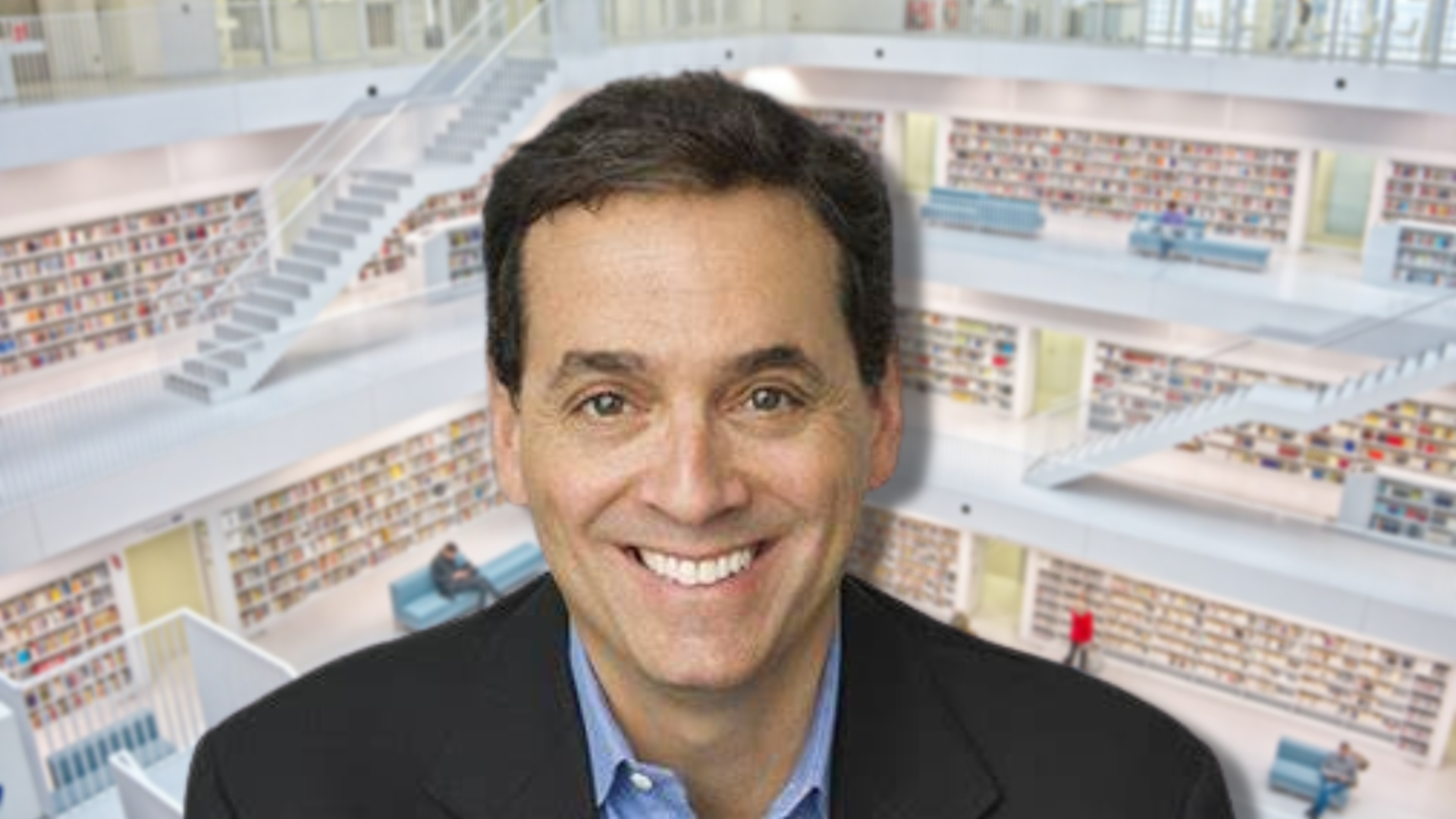
About the Author:
Daniel H. Pink is the #1 New York Times bestselling author of seven books – including his latest, The Power of Regret: How Looking Backward Moves Us Forward. His books have sold millions of copies around the world, been translated into forty-two languages, and have won multiple awards. He lives with his family in Washington, DC.
Additional Resources:
The Pinkcast | Weekly Newsletter
You'll Regret Not Clicking This Link Right Here
The Harvard Study of Adult Development | The Harvard Gazette
4 Kinds of Regret - And What They Teach You About Yourself | TED Talk
This Book on Amazon:
The Power of Regret, by Daniel H. Pink
If You Liked This Book:
The Second Mountain, by David Brooks
The Pathless Path, by Paul Millerd
Hell Yeah or No, by Derek Sivers
Excellent Advice for Living, by Kevin Kelly
Put Your Ass Where Your Heart Wants to Be, by Steven Pressfield
Be Your Future Self Now, by Dr. Benjamin Hardy

